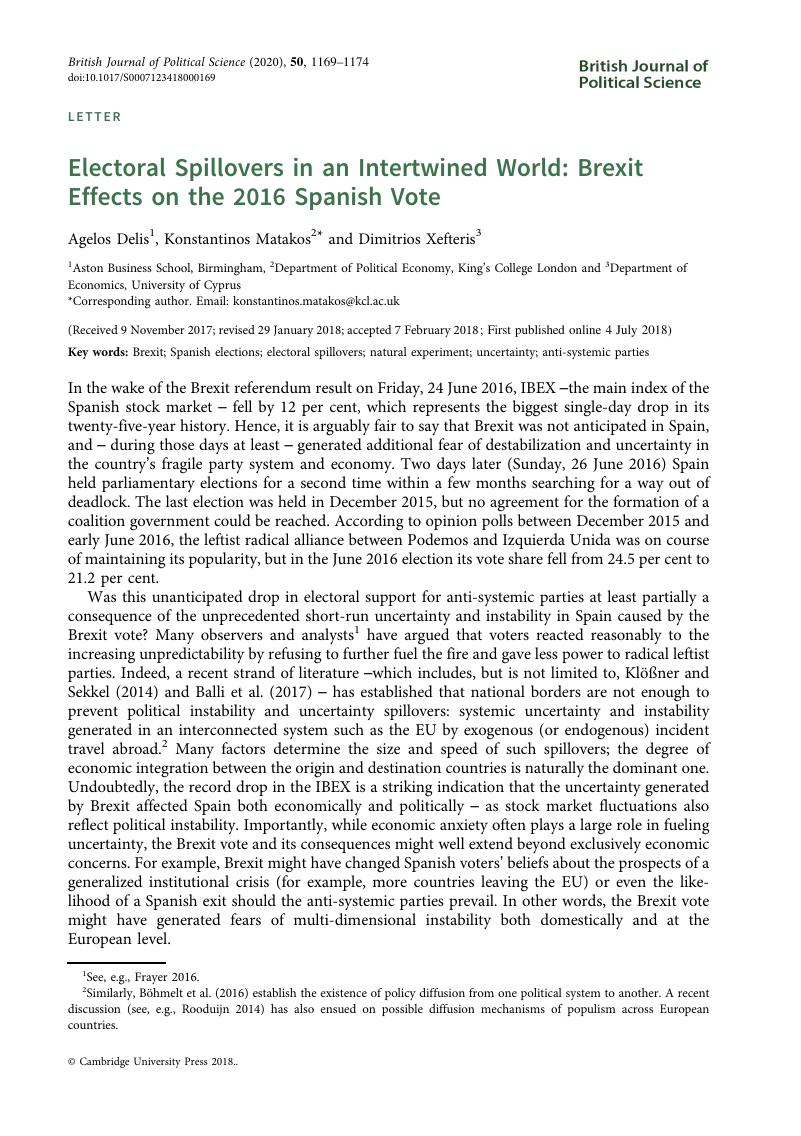Crossref Citations
This article has been cited by the following publications. This list is generated based on data provided by Crossref.
Kishishita, Daiki
and
Yamagishi, Atsushi
2021.
Contagion of populist extremism.
Journal of Public Economics,
Vol. 193,
Issue. ,
p.
104324.
Turnbull-Dugarte, Stuart J.
and
Rama, José
2022.
When the US far-right sneezes, the European far-right catches a cold. Quasi-experimental evidence of electoral contagion from Spain.
Electoral Studies,
Vol. 76,
Issue. ,
p.
102443.
Steiner, Nils D.
and
Landwehr, Claudia
2023.
Learning the Brexit Lesson? Shifting Support for Direct Democracy in Germany in the Aftermath of the Brexit Referendum.
British Journal of Political Science,
Vol. 53,
Issue. 2,
p.
757.
Kostyrya, Inna
Biletska, Oksana
Shevchenko, Marina
Kropyvko, Olena
and
Lysenko, Taras
2023.
The European Union as a supranational association and the problem of state sovereignty.
Cuestiones Políticas,
Vol. 41,
Issue. 76,
p.
172.
Carrieri, Luca
2024.
Awakening the Europhile Giant: EU Issue Voting in Western and Central‐Eastern Europe.
JCMS: Journal of Common Market Studies,
Vol. 62,
Issue. 1,
p.
262.
Carrieri, Luca
and
Morini, Marco
2024.
The Changing Structure of Political Conflicts in the South of Europe: An Analysis of Issue Voting in Four Countries.
Political Studies Review,
Vol. 22,
Issue. 1,
p.
55.
Böhmelt, Tobias
Ezrow, Lawrence
and
Zur, Roi
2024.
Anti-immigration party success abroad and voter polarization at home.
Electoral Studies,
Vol. 88,
Issue. ,
p.
102762.
Zanotti, Lisa
and
Turnbull-Dugarte, Stuart James
2024.
Surviving But Not Thriving: VOX and Spain in Times of COVID-19.
Government and Opposition,
Vol. 59,
Issue. 4,
p.
1128.
Chan, Ka Ming
2024.
Autocratization Spillover: When Electing an Authoritarian Erodes Election Trust across Borders.
Public Opinion Quarterly,
Vol. 88,
Issue. SI,
p.
828.
Carrieri, Luca
Conti, Nicolò
and
Loveless, Matthew
2025.
EU issue voting in European member states: the return of the pro-EU voter.
West European Politics,
Vol. 48,
Issue. 3,
p.
479.
Chan, K.M.
2025.
A tale of two cities: spillover effects of electoral shocks in non-democratic regimes.
Democratization,
Vol. 32,
Issue. 1,
p.
27.
Rodon, Toni
Guinjoan, Marc
and
Ioannidis, Nikandros
2025.
Electoral and partisan consequences of sovereignty referendum outcomes: A comparative analysis.
Party Politics,
Rodríguez, Irene
Rodon, Toni
Unan, Asli
Herbig, Lisa
Klüver, Heike
and
Kuhn, Theresa
2025.
Benchmarking pandemic response: How the UK’s COVID-19 vaccine rollout impacted diffuse and specific support for the EU.
British Journal of Political Science,
Vol. 55,
Issue. ,



